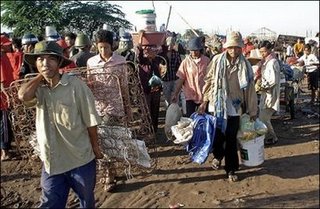Commentary: Cambodia must stop killing the messengerHONG KONG, Jun. 27LAO MONG HAYColumn: Rule by Fear
Posted at UPI Asia OnlineThe Cambodian delegation to the United Nations Human Rights Council launched an unprecedented and unwarranted attack on U.N. special representative of the secretary-general for human rights in Cambodia, Prof. Yash Ghai, during a session of the UNHRC on June 12 in Geneva. The delegation attempted to dismiss Ghai's report to the international community, claiming that it focused solely on negative aspects.
The Cambodian delegation, however, did not deny the veracity of the report. This attack should be seen as nothing more than an attempt to circumvent the important, if embarrassing, content of the report and to renege on the country's obligations to promote and protect human rights.
At the end of the discussion on Cambodia, the country's ambassador to the United Nations in Geneva, Chheang Vun, stated that Cambodia no longer accepted Ghai's mandate in the country and called on the UNHRC to review the special representative's nomination to this position. In doing so, Cambodia has effectively signaled that it will no longer cooperate with this important U.N. mechanism that was initiated to further respect for human rights and the rebuilding of the country as a whole, a mechanism which was created as the result of international consensus under the Paris Peace Agreements of 1991 that ended the war in Cambodia.
The government's reaction has raised a lot of concern, as the U.N. special representative's report contains many crucial elements that would permit Cambodia to move toward the effective protection and enjoyment of human rights. Yash Ghai is being targeted, not because of any actual bias or selectivity in his work -- he mentioned several positive developments, including the March 2007 ratification of the optional protocol to the U.N. Convention against Torture, more peaceful local elections held in April, the adoption of a new code of criminal procedure -- but rather because he has focused on the inconvenient reality of human rights in the country.
Among the main barriers to human rights highlighted in the U.N. special representative's report are the lack of an independent judiciary, political repression and detentions, a lack of progress concerning legal reforms, land-grabbing and forced evictions, corruption, the lack of freedom of speech, violations of indigenous peoples' land rights and impunity. All of these issues are central themes that concerned local and international organizations repeatedly have raised and are the key hurdles facing the country at the present time.
The Cambodian government's stance is unacceptable and presages a further degradation of human rights in the country. If the government is now unwilling even to cooperate with the international community's human rights envoy, it is likely that it will also increasingly clamp down on local activists working in favor of human rights and dealing with the crucial issues raised by the special representative. This may also pave the way for future attacks on the work of the Office of the High Commissioner for Human Rights in Cambodia. Given Cambodia's horrendous past, from which it is still struggling to emerge, any such signs of increasing authoritarianism and rejection of human rights and international cooperation must be taken very seriously.
The Cambodian government must halt this policy of personal attacks and non-cooperation and instead must engage in dialogue with the U.N. special representative in order to address the significant human rights problems that plague the country. Countries bound by human rights obligations towards the Cambodian people under the Paris Peace Agreements as well as donors, which include Australia, Canada, Denmark, France, Germany, India, Japan, South Korea, Sweden, the United Kingdom and the United States, must work with the Cambodian government to ensure that this government abandons its current stance and begins to address the country's pressing human rights issues in good faith, notably by implementing without fail all recommendations made by the special representative. All these countries and the Cambodian government must also ensure the independence of the judiciary, notably by severing judges' political party affiliations and ensuring the independence of and accessibility to the Supreme Council of the Magistracy, which is responsible for the nomination and discipline of judges, access to justice, an end to land-grabbing and forced evictions and progress in other needed legal and judicial reforms.
--
(Lao Mong Hay is currently a senior researcher at the Asian Human Rights Commission in Hong Kong. He was previously director of the Khmer Institute of Democracy in Phnom Penh, Cambodia, and a visiting professor at the University of Toronto in 2003. In 1997, he received an award from Human Rights Watch and the Nansen Medal in 2000 from the United Nations High Commissioner for Refugees.)
 Cambodia rejects U.S. human rights assessment
Cambodia rejects U.S. human rights assessment
























